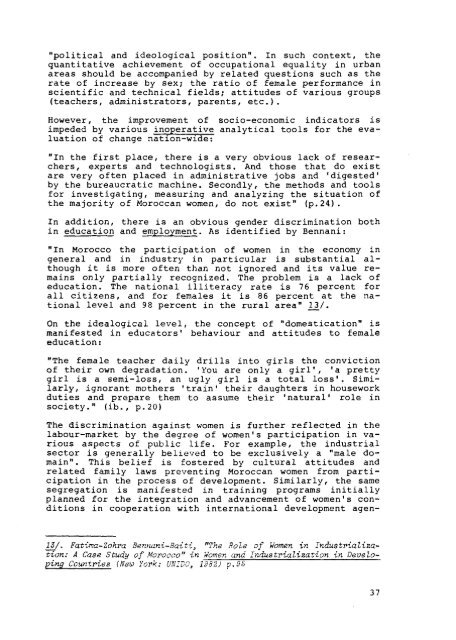Ifda dossier 47, May/June 1985
Ifda dossier 47, May/June 1985
Ifda dossier 47, May/June 1985
Create successful ePaper yourself
Turn your PDF publications into a flip-book with our unique Google optimized e-Paper software.
"political and ideological position". In such context, the<br />
quantitative achievement of occupational equality in urban<br />
areas should be accompanied by related questions such as the<br />
rate of increase by sex; the ratio of female performance in<br />
scientific and technical fields; attitudes of various groups<br />
(teachers, administrators, parents, etc.).<br />
However, the improvement of socio-economic indicators is<br />
impeded by various inoperative analytical tools for the eva-<br />
luation of change nation-wide:<br />
"In the first place, there is a very obvious lack of resear-<br />
chers, experts and technologists. And those that do exist<br />
are very often placed in administrative jobs and 'digested'<br />
by the bureaucratic machine. Secondly, the methods and tools<br />
for investigating, measuring and analyzing the situation of<br />
the majority of Moroccan women, do not exist" (p.24).<br />
In addition, there is an obvious gender discrimination both<br />
in education and employment. As identified by Bennani:<br />
I n Morocco the participation of women in the economy in<br />
general and in industry in particular is substantial al-<br />
though it is more often than not ignored and its value re-<br />
mains only partially recognized. The problem is a lack of<br />
education. The national illiteracy rate is 76 percent for<br />
all citizens, and for females it is 86 percent at the na-<br />
tional level and 98 percent in the rural area" g/.<br />
On the idealogical level, the concept of "domestication" is<br />
manifested in educators' behaviour and attitudes to female<br />
education:<br />
"The female teacher daily drills into girls the conviction<br />
of their own degradation. 'You are only a girl', 'a pretty<br />
girl is a semi-loss, an ugly girl is a total loss'. Simi-<br />
larly, ignorant mothers 'train' their daughters in housework<br />
duties and prepare them to assume their 'natural' role in<br />
society." (ib., p.20)<br />
The discrimination against women is further reflected in the<br />
labour-market by the degree of women's participation in va-<br />
rious aspects of public life. For example, the industrial<br />
sector is generally believed to be exclusively a "male do-<br />
main". This belief is fostered by cultural attitudes and<br />
related family laws preventing Moroccan women from parti-<br />
cipation in the process of development. Similarly, the same<br />
segregation is manifested in training programs initially<br />
planned for the integration and advancement of women's con-<br />
ditions in cooperation with international development agen-<br />
IS/. Fatima-Zohra Bennani-Baiti, "The Role of Women in Industrializa-<br />
-<br />
tkn: A Case Study of Morocco" in Women and Industrialization in Develo-<br />
ping Countries (Neu York: U m O , 1982) p.95
















